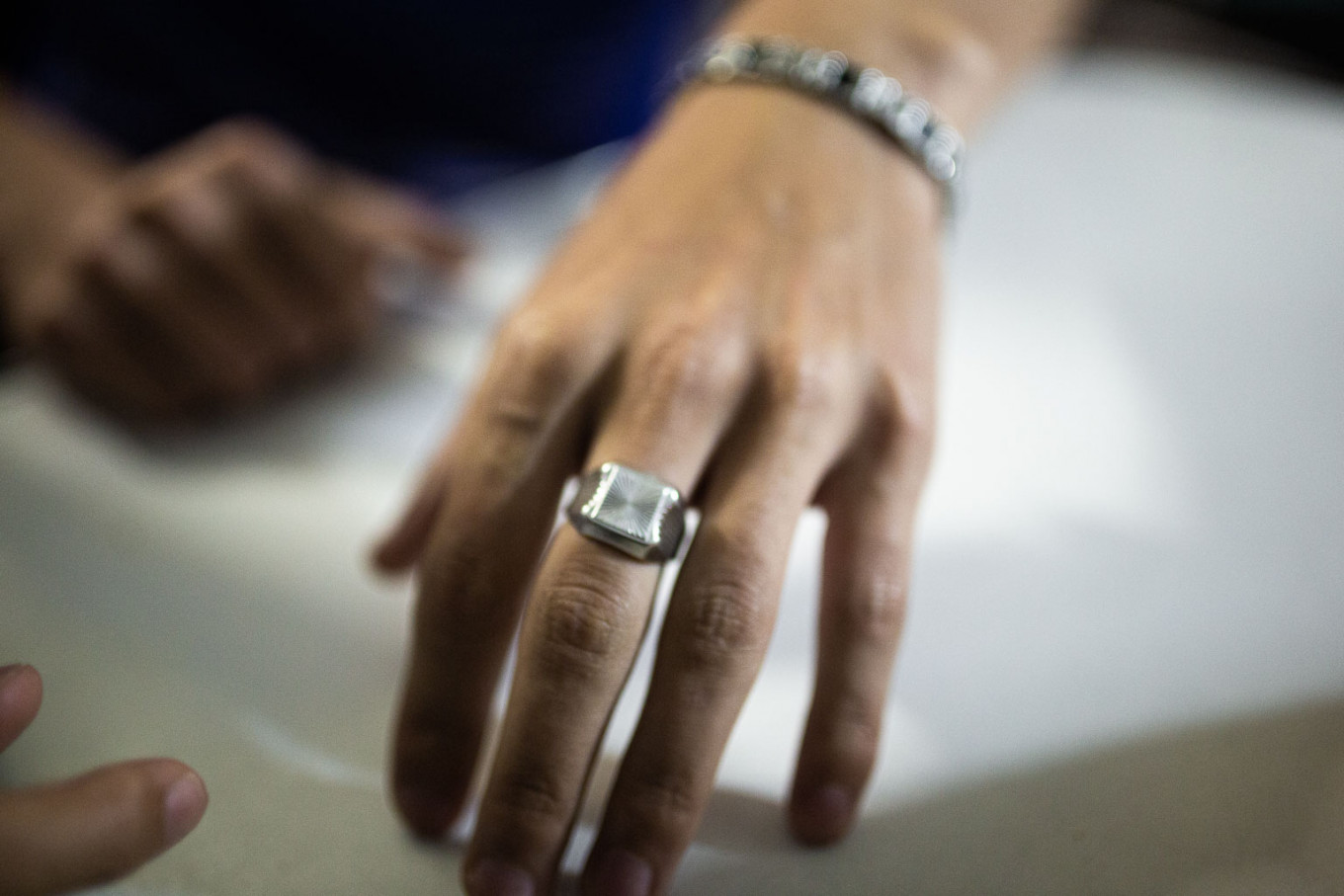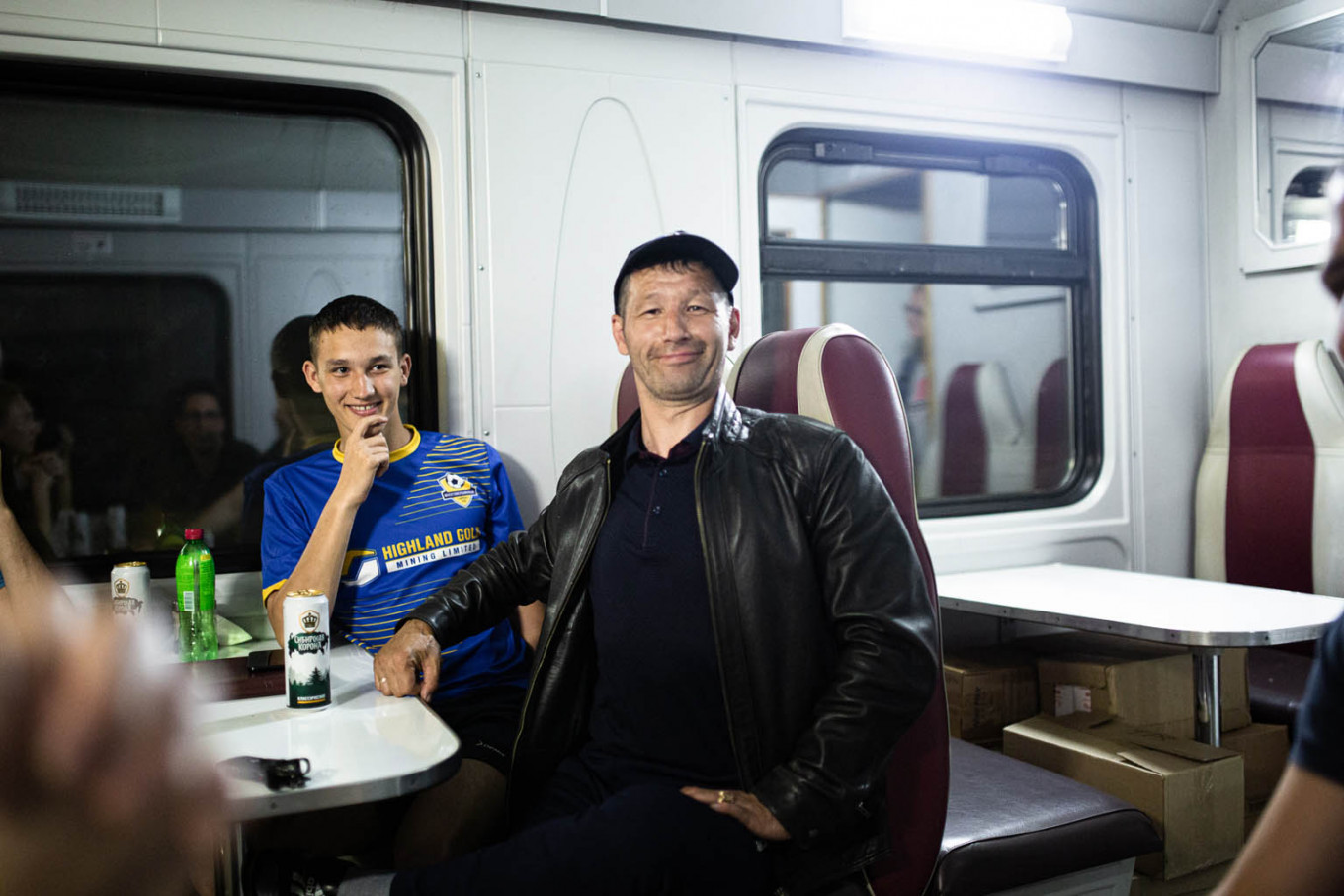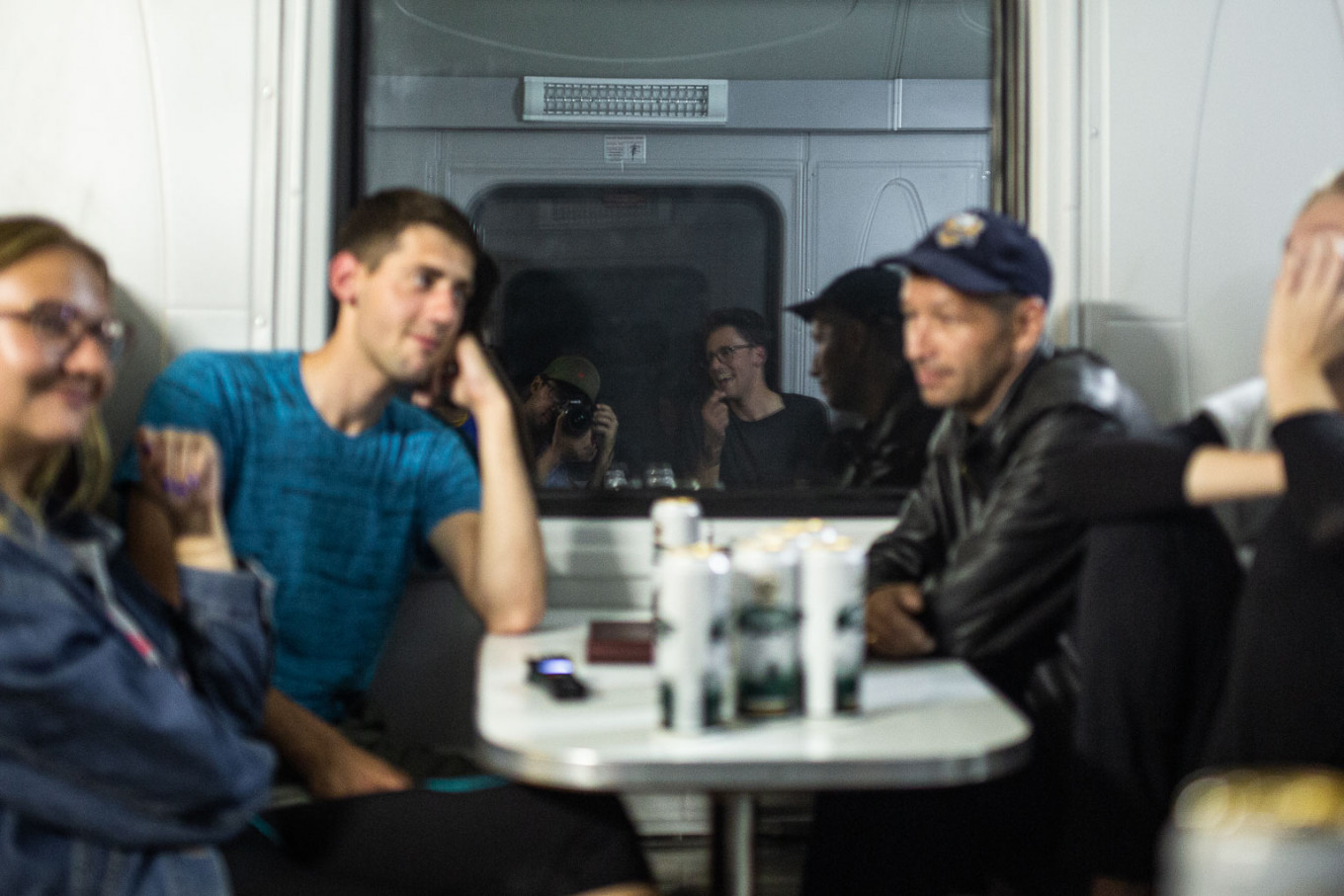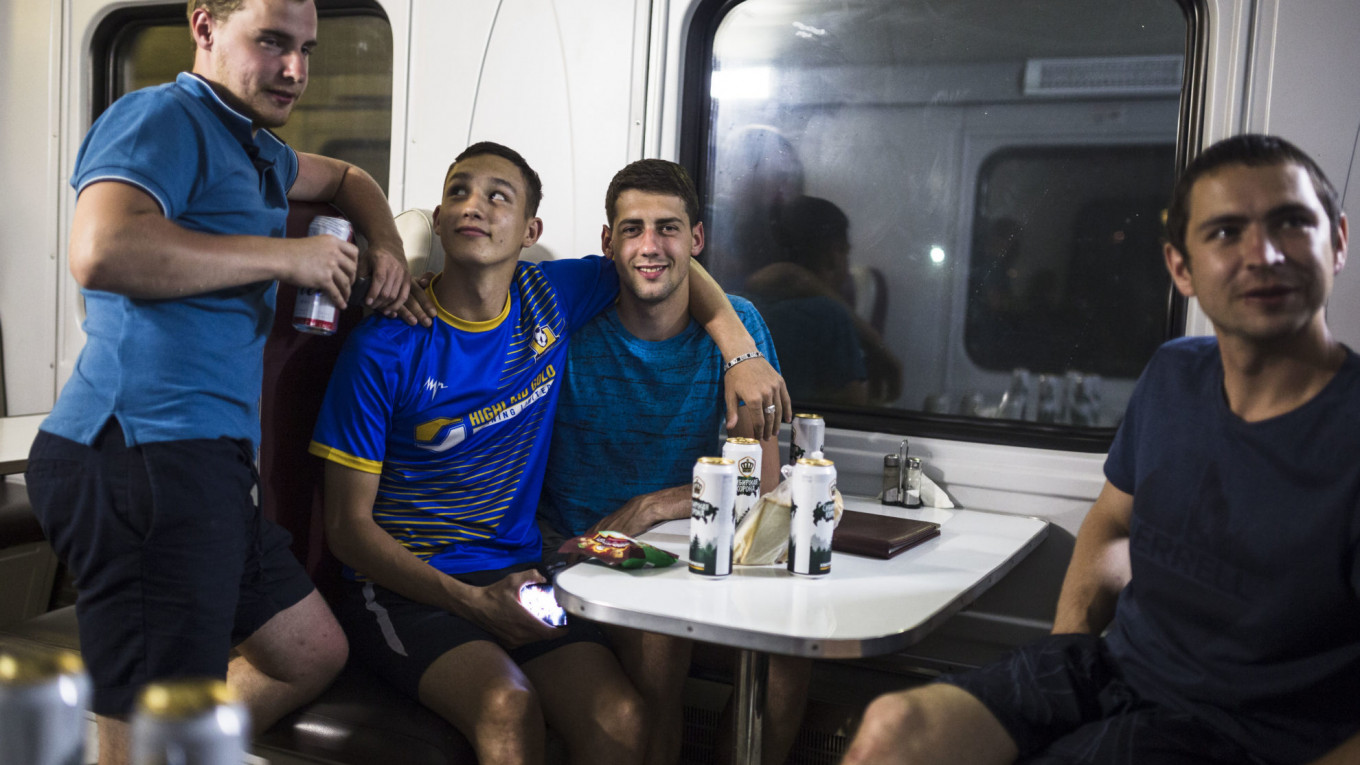Night train Blagoveschensk – Khabarovsk. The Mesto47 team is heading to the dining car. We take a table across a group of miners with an empty bottle of vodka. From their conversation we figure that they are travelling from a corporate event on lake Baikal, a soccer competition commemorating Steel Miners’ Day. They are having a drunk discussion about their final match and celebrating their victory as they bring the competition’s Cup back home, to Mnogoverschinniy, a tiny village in Khabarovsk region that mines 3.5 tons of gold each year.
They hear a foreign language and initiate a conversation. They ask us where we are from, what we are doing and where we are heading. They take me for a prostitute who accompanies a foreigner and ask me how much I charge for my services per hour. I get angry and tell them I am a journalist. They apologize and ask for a permission to sit at our table. We drink and talk. The most talkative are their leader Jenya, he is around 50 and Grisha, 21.

9:30 pm Two vodka shots. Miners profession. Jenya is loud. He shows off his huge golden ring, bracelet and a shiny heavy thick chain on his neck. He lets us take a photo of his jewelry.
Marina: What is it like to be a miner?
Jenya: We are living in Mnogovershinny village. It is a Swiss gold mining company. A miner is a person who comes under ground and starts extraction. He comes out happy, puts his hammer on one shoulder and goes to lunch with a big smile on his dirty face. In order to become a miner, you have to be strong and dumb. Why strong? Because it is physical labor, you have to turn off your brain and work, work, work. Why dumb? So that you are not scared in a dark confined space. You are alone there, 120 meters under ground with a lantern and a hammer that weights 70 kilos. We have this black humor joke: if I die, they get me out, then dig me back under ground. I will chill there for three days, and they will send me back to work. We have this superstition; we don’t have a word “last,” we say outermost. If you ask a miner, which shift he has today, he will never reply the last one. You can’t say that, what if it really becomes last?

Grisha: I am doing vocational training for miners and each summer I work under the ground. You just turn on your flashlight on and walk. Rockslide can happen anywhere. If a rock that weighs a ton falls on you, your helmet will not save you. It happened twenty times, when you sit there, look at a rock and think, “It looks like it’s about to fall,” but it doesn’t. You walk away a bit, and it falls down. At the end of the day, everybody has their mission, we are all like ants in a big ant hill. A miner should be paid as much as an engineer. Nothing will happen without him, he does the most difficult job.
Jenya: A mine does not forgive mistakes. If you don’t break nature laws, no accidents will occur. Are you in doubt? Don’t go there. Don’t remember something? You should not do it.
10: 10 pm We drink two more shots. Life in Russia’s Far East. Putin.
Grisha: if you watch mass media in Moscow, what do they say about people’s life, how do they live, good or bad? When you take a train through Far East, have you seen many beautiful houses and roads?
Marina: No.
Grisha: It is 21st century, and life outside of Russia is changing rapidly. But in our country people are learning again how to hammer in nails. A westerner will live till he is 100 years old, he will be happy, the ecology is OK there, they have Teslas. Not like here, people live until 60, when they retire. Miners used to earn more: older generation in the USSR were paid 100 rubles. They managed to go to Khabarovsk just for a weekend to drink beer. We knew that we worked in bad conditions, but at least we were paid well for this and the family was covered. Now they pay pennies, and you might die, so what’s next?
Our president doesn’t fulfill a single promise. It feels like Far East lives in a separate country, not in Russia. They don’t open new kindergartens. Children are playing in dirt. People work without following safety instructions. They work anywhere, as they need to provide for the family. He gets pennies, but he does it for the family. Do you have many bad roads in Moscow?
Marina: No
Jenya: I am an old man, and this is young people talking. Just imagine what opinion they have about Russia. I am sure that the youth will not betray the motherland, but it will not follow its president.
Grisha: To be honest, I feel like half of Russia will be sold soon. I can see how they sell forest. Yes, Siberia has enough forests for 1000 years to come. Locals are not allowed to cut the wood. But then some guys from Moscow come with connections and they do it. The same goes for fish. We have this law in Far East if you just want to fish, they will fine you for 1 million rubles. And then the fish goes to Moscow, it is sold cheaper than here. It goes to the center from Far East it doesn’t get to the locals. You don’t even pay attention to domestic politics.
Jenya: FSB works well here, so shhh…
Grisha: At the end people do not have anything. How are we supposed to live? In a country that doesn’t want to support us. People, who sit up there, don’t fight for it. For what they need to fight. They are just unreachable.

11 pm We meet a Korean dude, he buys beers for everyone. The beer’s called Siberian Crown. We drink and chat about gays.
Jenya: Marina, tell me, are we normal people?
Marina: You have a special approach towards life. You say everything as it is, you don’t really have a filter.
Jenya: Yep, we are not about filter for sure.
Korean dude tells Grisha that he is beautiful.
Grisha: Translate to him we don’t say beautiful to a man, this is unacceptable. You can’t say this, it will lead to no good. When in Rome, do as Romans do!

Jenya: We don’t have gays. We just destroy them. It does not matter if he is good or bad.
Marina: if you don’t have gays, why is it a problem?
Jenya: We had one guy move from Irkutsk to our town with his 3 mln rubles motorcycle and tubes in his ears. We put a lock on his ears and locked him up to a door handle and left. After four hours we came and unlocked him. He quit and left.
Grisha: You need to experience living here for some time. People are programmed this way: we are one kind of people, and you are another. If we give in, there will be no families. How will women have children? And there are so many single girls nowadays, they just don’t give birth. The nation is just dying out. Who will love you then if everyone is gay?
Normally, after progress and human development reach their, regress starts. Same sex marriage means that people are killing themselves just because they made up some kind of addiction in their head. Can a birch tree grow and then suddenly become an orange tree? It is a psychological disease, something must have gone wrong with his head. There are gays who were shown images of naked women, and they wanted them. They just deny it. Faggots are useless people.
Jenya: One guy from our village fell in love with a girl. A girl left for Saint Petersburg. He moved there and got a job of a bouncer at a night club. He told me, “I come out of the club, and I see two dudes kiss. I tell them to leave, but they don’t listen.” The administrator told him that this was not accepted. They fired the guy. You see, we are raised differently. We don’t understand it when a dude kisses a dude.
An advantage of the Far East is that you will not let them in here. Your bold guy will not bring them to march here. (editor’s note: reference to Yuri Luzhkov, former mayor of Moscow, who allowed Moscow’s first gay parade). A man and a muizhk are different. A muzhik will defend the motherland. A man can commit treason.
23: 50 We finish our beers. The speech is not that clear already, but we somehow manage to talk about soccer and poetry.
Grisha: I don’t like reading that much. They gave us Esenin (editor’s note: famous Russian poet) to read at school. Some alcoholics wrote something beautiful, yes, but it does not mean that children should learn this by heart. In poetry I don’t see anything beautiful or useful for me in life.
Actually, I would like to move to Rio de Janeiro. It is a beautiful city with masquerades, parades, and ocean shore. It is also a soccer capital. I used to have just one favorite player: Cristiano Ronaldo. And now when you watch soccer, you see many players stand out.

Soccer in Russia is not in the best condition. We have no soccer fields. We’ve got million talents in Russia. Did you see our team play at the championships? I think they should be fired. So many sick kids could be getting their treatment with the money they are making. Foreign soccer players play soccer professionally, and they get paid accordingly. Our players just kicked the ball like kids in the backyard. They just talk, they don’t act. Tell the youth, “we will pay you a quarter of that salary,” and a younger generation will start winning.
Midnight. Empty bottles and a snoring miner at the table. A fat train stewardess in a short skirt decisively walks our way.
Fat train stewardess: Dining car is closing. Thank you, good-bye.
Marina: What time is it? Could we stay a bit longer?
Grisha: You have foreign guests here. And you are closing down so fast.
Fat train stewardess: Thank you, good-bye.
We obey and continue to drink in a third class carriage, but with no recorder running.
This story was first published by Mesto47. You can read this and other stories or listen to a podcast on their site.
A Message from The Moscow Times:
Dear readers,
We are facing unprecedented challenges. Russia's Prosecutor General's Office has designated The Moscow Times as an "undesirable" organization, criminalizing our work and putting our staff at risk of prosecution. This follows our earlier unjust labeling as a "foreign agent."
These actions are direct attempts to silence independent journalism in Russia. The authorities claim our work "discredits the decisions of the Russian leadership." We see things differently: we strive to provide accurate, unbiased reporting on Russia.
We, the journalists of The Moscow Times, refuse to be silenced. But to continue our work, we need your help.
Your support, no matter how small, makes a world of difference. If you can, please support us monthly starting from just $2. It's quick to set up, and every contribution makes a significant impact.
By supporting The Moscow Times, you're defending open, independent journalism in the face of repression. Thank you for standing with us.
Remind me later.






